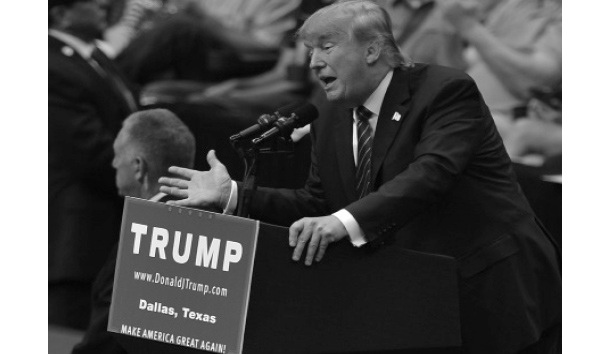Donald Trump’s call for a moratorium on Muslim immigration has drawn fire from the establishment right. “It’s a violation of our Constitution, but it also undermines the character of our nation,” Republican presidential candidate Carly Fiorina told the Des Moines Register. National Review’s Jim Geraghty opined that Trump’s plan created a forbidden “religious test for immigration” and thus “would violate the Constitution.” The usual suspects have taken to the airwaves expressing confidence that the Supreme Court would be compelled to strike down a ban on Muslim immigration.
Considering 21st-century America’s worship at the altar of equality, such assumptions are understandable. However, a closer look at historical practice, the Constitution, and the High Court’s exegesis yields a different conclusion.
Since colonial times, exclusion of aliens presenting undesirable characteristics has been the norm. As early as 1645, colonial Massachusetts prohibited paupers from entering the jurisdiction. Other colonies followed this example and added felons and “gaol-birds” to the list. Regulating the entry of aliens was left mostly to the states until the last quarter of the 19th century. At that time, Congress passed a series of measures excluding such undesirables as convicts, prostitutes, the insane, and immigrants infected with contagious diseases. Congress also ended all Chinese immigration in 1882 with the Chinese Exclusion Act.
In the early 1900’s, President McKinley’s assassination and the threat of anarchism prompted Congress to exclude all foreigners advocating the violent overthrow of the United States or the rule of law. The two world wars prompted further measures, and the Cold War saw exclusion of aliens “advocating the economic, international, and governmental doctrines of world communism.”
From an historical prospective, the exclusion of Muslims would be no different from the exclusion of felons, anarchists, or communists. Those adhering to the religion of Islam, in any form, possess undesirable characteristics inasmuch as they are joined with a religion that mandates warfare against unbelievers. Some so-called moderate Muslims do live peacefully with non-Muslims. However, as Jihad Watch’s Robert Spencer reminds us, “this is not because the teachings of jihad have been reformed or rejected; they have simply been ignored, and history teaches us that they can be remembered at any time.” Any Muslim who begins to take his religion seriously must conclude that there is no holier duty than jihad and the establishment of sharia.
Despite claims of elite opinion, the Constitution does not prohibit Muslim exclusion. Jim Geraghty points to Article VI, which in pertinent part provides that “no religious Test shall ever be required as a Qualification to any Office or public Trust under the United States.” By its plain terms, the ban applies only to federal officeholders. A religious test cannot be a precondition to receiving a job in the public sector. But an alien seeking entry to the United States holds no office and is not part of the public sector. Article VI is inapplicable to immigration policy.
Moreover, the Constitution typically does not apply to noncitizens located outside of the territory of the United States. While the First Amendment does forbid Congress from making laws “respecting an establishment of religion, or prohibiting the free exercise thereof,” an alien residing in, say, Syria has no standing to invoke U.S. constitutional protections.
The Supreme Court has been very deferential to exclusion provisions. In the Chinese Exclusion Case (1889), the Court held that “the power of exclusion of foreigners being an incident of sovereignty . . . cannot be granted away or restrained.” In other words, the legislative and the executive branches have sole power to regulate all aspects of immigration—their power is plenary. This principle has been upheld in countless cases. For example, in Knauff v. Shaughnessy (1950), the Court reaffirmed that “it is not within the province of any court, unless expressly authorized by law, to review the determination of the political branch of the Government to exclude a given alien.”
The Court has also declined to play in the constitutional sandbox of Due Process regarding alien exclusions. In Knauff, the Court observed that “Whatever the procedure authorized by Congress is, it is due process as far as an alien denied entry is concerned.”
In recent years, various activists have urged the Court to abandon deference to the political branches in immigration matters. The justices are usually eager to create new rights and insert themselves into policy decisions. But for the moment, substantial precedent supports the Court taking a hands-off approach to a statute prohibiting Muslim immigration.
At the current rate, the United States will admit approximately one million new Muslim immigrants in the next ten years. Such immigration poses challenges to our legal system: According to the Center for Security Policy, more than half of U.S. Muslims polled believe either that they should have the choice of American or sharia courts, or that they should have their own tribunals to apply sharia. A mere 39 percent of U.S. Muslims polled said that Muslims in the United States should be subject to American courts.
Despite the clamor, Trump’s proposed moratorium on Muslim immigration is congruent with historical practices, the Constitution, and Supreme Court case law. The GOP establishment’s swift condemnation of the proposal shows how ignorant they are about settled law and the dangers facing our country.

Leave a Reply